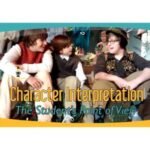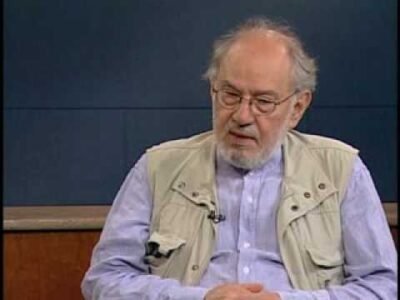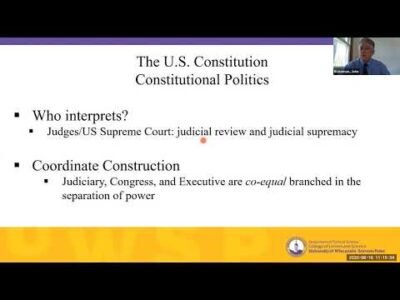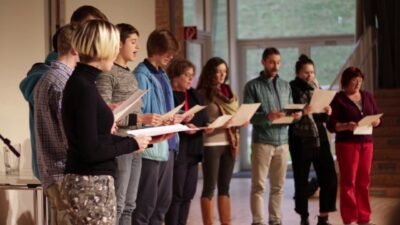Transcriber: Keun Wook Steve Kim Reviewer: Tatjana Jevdjic In the early seventies, I was a very young rabbi in a very large congregation in Cape Town, South Africa. That was the period when Apartheid, the laws of discrimination against people based upon their race, upon their colour, were at their height.
And it was obvious to me as to so many people of faith, that this system that deprived people their fundamental human rights, was in complete conflict with religious faith and with scriptural teaching that affirms the dignity of each and every human person, of their fundamental, inalienable freedom and dignity,
Born out of the fact that each and every human being is created in the divine image, as indicated in Genesis. So it was obvious to me that I had to be engaged in social action, to try to do what I could within this iniquitous context.
And I joined together with others in various activities. But it was important for me that my community, that my faith tradition, be seen to be engaged in this struggle. One of the few ways one could go about bringing people together across the racial divide at that time, was through religion.
And so together with the leaders of the Catholic, Anglican, Methodist, Muslim and Jewish community, we founded an interfaith forum, a council of Christians, Muslims and Jews, one of the first of its kind in the world. So I came to interfaith relations in fact, out of a commitment to social justice.
But as I got involved in this process, I discovered some very important things. First and foremost, I was struck by how these people, who I assumed knew a little bit about Judaism and about Jews, how ignorant they were about me and about my tradition. They had misconceptions, and often biases, prejudices,
Simply out of the fact that they didn’t really know me and my community. It was obvious to me then that if I wanted to combat prejudice and bigotry against me and my community, interfaith relations is really important. But to tell the truth, I discovered something else.
I discovered that I was amazingly ignorant about them, that I too had prejudices and misunderstandings about them. And aside from the fact that surely it was just and right, that I represent them the way they understand themselves, If I really want them, I wanted them, to know me,
It was my responsibility to get to know them. In addition, I became even more aware of the fact that even if there were some profound differences theologically between the different communities, different faith traditions, we shared such profound values, such fundamental values:
Our sense of the transcendent presence in the world and meaning to life, our appreciation of the divine presence in each and every one, each and every human person created in the divine image and its concomitant responsibility to promote justice and righteousness and peace in the world.
If one really believes in those things, then surely one has a responsibility to work together with others who believe in them, so that we are greater than the sum of our different parts. And as I sought to engage with my colleagues in these areas, it became even clearer to me, even more important,
That I deepen my own knowledge of who I am and what I stand for, in order to present myself appropriately to my colleagues. So in fact, interfaith relations helped me deepen my own faith commitment, my own understanding. Something else, however, happened in the course of this engagement,
Where I met wonderful people, people who were truly inspiration, an inspiration in so many ways. It occurred to me, suddenly, that I had never really given any thought to the meaning and significance of other religious traditions. Even though I was already a rabbi, even if I was a very young one.
And I realised that there was a paradox. That throughout the course of history, our religions that have taught the idea of an omnipresent, all-present deity, a God who is the source behind the cosmos, the energy that motivates it, that guides us, that has created us in all our diversity.
That we have at the same time tried somehow to encapsulate that divine presence in one tradition. If God has created us in all our diversity and as Psalm 145 says, “God’s mercies extend to all his creatures,” then surely if God relates to us in different ways,
There must be different ways of relating to God. And anyway, how can one religion encapsulate the totality of the divine. God is more than any one religion. And I realised, as I got involved in this interfaith encounter, that through meeting people, I was getting a glimpse beyond my own particular tradition.
We affirm that we meet God in many different ways and that the human being is created in the divine image. And therefore when we meet with others, as the Jewish philosophers Martin Buber and Emmanuel Levinas had thought, when we meet with others in the fullness of their humanity,
That in fact is an encounter with God, that is an encounter with the divine, especially so if one is meeting someone in their sense of the divine presence, in her or his life and community. And therefore interfaith relations for me, I realized, was a religious experience.
It was an experience that expanded my horizons, my understanding of the divine presence. So, in addition to deepening my own understanding of who I was, interfaith encounters gave me a greater sense of the divine in the world, and are an enormously enriching gift for me in my life. I mentioned the story
Of how I had worked together with my colleagues to establish an interfaith forum in South Africa. The process of getting this going wasn’t that simple. Not only because of political realities, but also because of certain religious hurdles. In South Africa at that time, the vast majority of those who supported the ruling party,
The “Nationalists,” known as Afrikaners of Dutch origin, were members of the Dutch Reformed Church. It was often called “the Nationalist Party of Prayer.” And I knew that any interfaith initiative was only going to be meaningful if I could engage somebody from that community.
I had heard of a Dutch Reformed minister, “duminy” in Dutch or in Afrikaans, who was meeting with Catholics, in downtown Cape Town. Now I imagine that for most of you, that’s no big deal. But those of you who are familiar with the demonology of the Dutch Reformed Church from that period,
May be familiar with the fact that the Dutch Reformed Church taught, or should I say the Afrikaner religious community taught, that there were two great dangers. One was the “Swart gevaar,” the Black danger, and the other was the “Rooms gevaar,” the Roman Catholic danger.
And I thought, if this guy is having a dialogue with Catholics, maybe he’ll meet with Jews too! So in my naivety, I made an appointment to see him, and sat down, he received me graciously. And I opened with my gambit, which had worked so well until now. I had said, “You know, father/pastor/reverend/sheikh,
The things that bring us together are so much more important than things that keep us apart.” And they had all agreed and were happy to participate in this particular initiative. But when I said that to this duminy, he replied, with a very strong South African accent,
“To tell you the truth, rabbi, I cannot agree with you, because the most important thing in my life keeps us apart: my belief in Jesus as my personal savior, and anybody who does not share that is going to go to hell, and therefore, Rabbi, I can only meet with you
If I do my Christian duty to save you.” Fortunately, I didn’t lose my cool. And my response, which I’m not sure that I understood the fullness of its importance at the time, I said to him, “Well, thank you, Duminy, for your honesty. I still want you to come very much to these meetings
Because I think it’s important that you understand me and I certainly want to understand you. And you know what, you have to come now, because I’m giving you the opportunity to tell me about your faith.” And he came along, and he became, I would say,
Much more open in the course of our discussions, and brought others along with him. This was a very salutary experience for me. Because it, first of all, clarified the importance of not having lost my cool, and not being offended by what he said,
But above all, the importance of allowing people to discover that human encounter, interfaith encounter, that can broaden not only our sense of the divine, but can even change our own theological understandings, and make them so much broader, encompassing and so much more embracing. I saw this too when I was in Ireland.
After South Africa, we moved to Ireland, where I was Chief Rabbi. This was at the height of the Troubles of the late seventies, early eighties, when people were using, abusing, religion, in the context of the conflict to demonize one another. Together with the Christian Primates of Ireland,
We founded an Irish council of Christians and Jews. And there again, one saw that when one could manage to bring people together, and enable them to see each other as creating a divine image, each one as a child of God, instead of religion being a barrier, religion could be a wonderful bridge
That could enable people to embrace, to work together, and a source of healing and reconciliation. Things of course improved enormously after I left Ireland, just as they improved miraculously in South Africa after we left. In fact, things tend to improve in most places when I leave,
And some people want me to leave Jerusalem, in the hope that things will be better in the Holy Land. But seriously, in all these places, religion has been abused. And not just in these places, but in so many other parts of the world. We’ve heard about Nigeria, Sri Lanka and Kashmir.
And it’s not good enough, I think, to simply blame nasty politicians for manipulating religion. There’s something a little more that we need to be self-critical about, in terms of the way religion is used and abused. Of course, a lot of this has to do with power, as we heard now from Brian Grim.
I’m simplifying his wonderful sociological analysis. But power is the problem very often, when people have too much of it, they often tend to abuse it. And one needs checks and balances, but this is a human problem. But I think there is another aspect
To understanding why religion is often abused in a terrible way. And I think it has to do with the relationship of religion and identity. Religion seeks to give meaning to our understanding of who we are, as individuals, as part of a family, as part of a community,
As part of a people, even as part of humanity. And because it is wrapped up with these different components of human identity, religion nurtures those identities, it gives them meaning, it gives them purpose. But when those identities are in situations of conflict, and when people feel threatened,
They turn to what nurtures those identities, for support, for succor, for self-confidence, for reassurance, for self-justification. Sometimes then, that also becomes self-righteousness. And it becomes deprecating and denigrating of the other and even delegitimizing of the other. Religion has been abused in terrible ways in the course of history
And still is today in many parts of the world. And that sometimes leads people to think that therefore the solution is to do away with religion, and to do away with identities altogether. That was the vision that John Lennon had in his wonderful song “Imagine.” You remember, “Imagine no more countries,
It isn’t hard to do, nothing to live or die for and no religions too.” But I’m sure while John Lennon was motivated by the noblest of impulses, that this is a complete fallacy. Because identity is who we are. If you don’t have an identity, if you don’t know who you are,
As those different components of person, family, community, nation, you are rudderless, you are without psychological anchorage. You don’t have not only the stability of your own self-understanding, you are vulnerable to all kinds of winds, and of forces, and especially to extremist ideologies that manipulate people
Who are rudderless and who are vulnerable within society. The challenge is not to get away of these important components, that make us who we are, let alone the source of meaning and understanding to our existence, which is what religion is. The challenge is how to utilize identity,
How to use religious faith and commitment, in a manner that leads us to embrace others, and to serve others, and not to denigrate them, not to disparage them, and not to, God forbid, to demonize them. Indeed the challenge of everything in this world, of everything within us and around us,
Is how to ensure that what we have and that what we can engage is a source of blessing, and not, God forbid, a source of curse. More often than not, it is the negative image of religion that the media tend to be more interested in giving attention to.
And the wonderful things, the source of inspiration, that comes from religion, and the source of understanding, and engagement, and appreciation of one another, that comes from interfaith relations, is often ignored. But the truth is that there has never been as much interfaith understanding and cooperation in our world ever than there is today.
Whether it is through dialogue, through understanding, or whether it is joint initiatives, for the common values and the common good. Interfaith relations today is exponentially growing in leaps and bounds. There are hundreds upon hundreds of organizations, probably thousands in our world, seeking to promote understanding, cooperation, collaboration,
And addressing the challenges of our time, bringing faith communities together. Here, in Italy, there are many. I might just mention some, like, in this city, the wonderful Community of Sant’Egidio or “The Focolare Movement.” And there are international bodies, like the “World Conference of Religions for Peace,”
Which embraces some 15 religions in some 70 countries around the world, the “United Religions Initiative.” You’ve heard the reference made to the “United Nations Alliance of Civilizations.” Recently, King Abdullah of Saudi Arabia established in Vienna, together with the governments of Austria and of Spain, a center for interreligious and intercultural dialogue.
And of course, in addition to all these international bodies, there are those, the plethora of organizations, in different locations around the world. Where I live in Israel, my organization, the “American Jewish Committee,” where I’m responsible for its interfaith relations around the world, helped found the “Interreligious Coordinating Council.”
This is an umbrella organization for over 60 organizations in Israel, promoting interreligious dialogue and understanding, between Muslims, Christians and Jews, and many crossing over, between Israel and the Palestinian Authority. AJC, my organization, also helped establish leadership organizations in Israel. We have a “Council of Religious Leaders in Israel,”
That embraces all the different denominations in the Holy Land. All the Christian denominations: Islam, Judaism, Druze, Samaritan, Bahá’í, Ahmadiyya, all the different communities brought together. We even have a “Council of Religious Institutions of the Holy Land,” that brings together the leadership of the Palestinian Authority and the religious leadership.
Muslim and Christian together with the Chief Rabbinate of Israel, in an organization, the first of its kind ever in history. These organizations are not going to bring an end to the conflict, unfortunately. That is in the hands of the politicians. But they are critically important testimonies of what is possible.
And they are an enormous resource for the day when peace will come. And people will learn how to be a source of enrichment and of a gift to one another. Wherever we are in the world, interfaith relations, sincere engagement with those of other faiths broadens our perspective of the divine,
Gives us a greater sense of the divine presence in the world, enables us to overcome fears, suspicions, hostilities, and above all enables us to see our differences, not as, God forbid, something to denigrate, but as something to celebrate. Thank you. (Announcer) And thank you to Rabbi David Rosen.
#Understanding #religious #roots #David #Rosen #TEDxViadellaConciliazione







No comment yet, add your voice below!